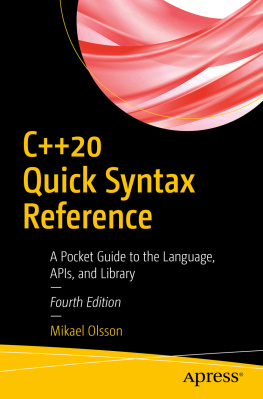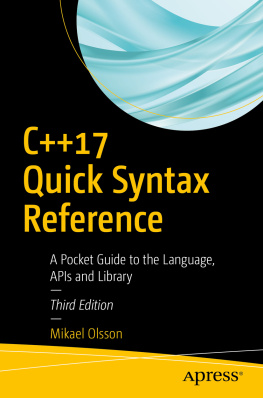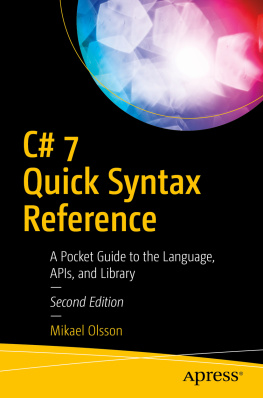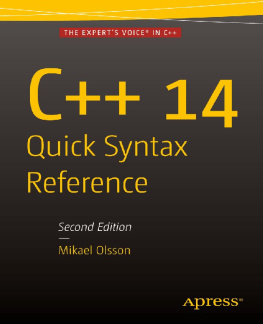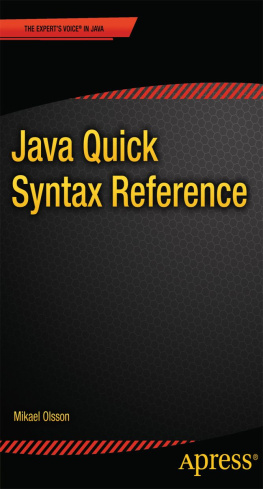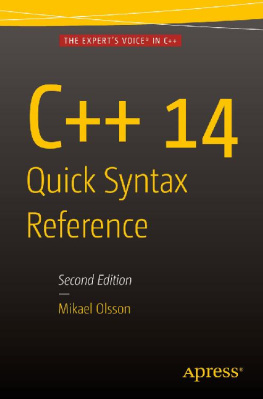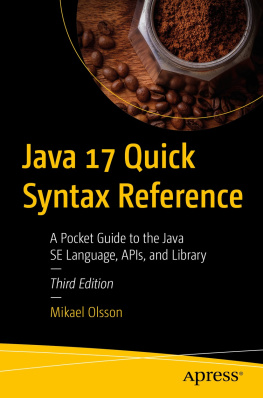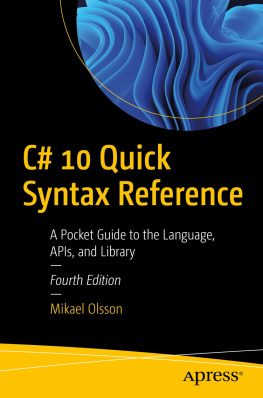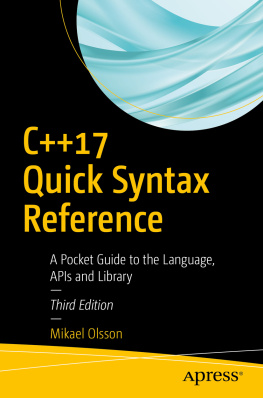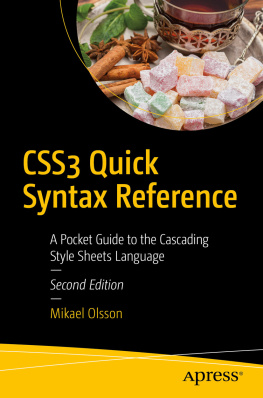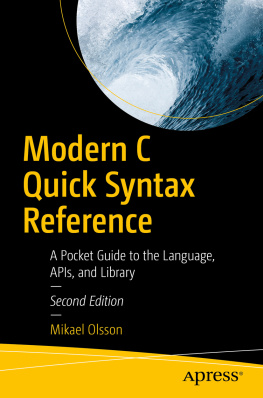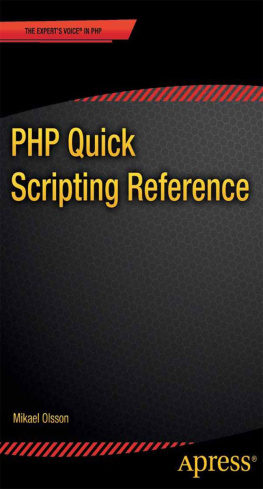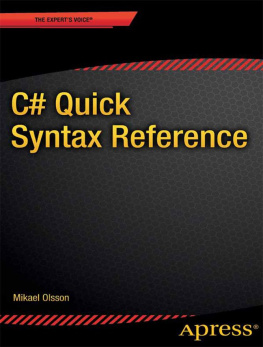Mikael Olsson - C++20 Quick Syntax Reference A Pocket Guide to the Language, APIs, and Library.
Here you can read online Mikael Olsson - C++20 Quick Syntax Reference A Pocket Guide to the Language, APIs, and Library. full text of the book (entire story) in english for free. Download pdf and epub, get meaning, cover and reviews about this ebook. City: Berkeley, CA, year: 2020, publisher: Apress L. P., genre: Computer. Description of the work, (preface) as well as reviews are available. Best literature library LitArk.com created for fans of good reading and offers a wide selection of genres:
Romance novel
Science fiction
Adventure
Detective
Science
History
Home and family
Prose
Art
Politics
Computer
Non-fiction
Religion
Business
Children
Humor
Choose a favorite category and find really read worthwhile books. Enjoy immersion in the world of imagination, feel the emotions of the characters or learn something new for yourself, make an fascinating discovery.
- Book:C++20 Quick Syntax Reference A Pocket Guide to the Language, APIs, and Library.
- Author:
- Publisher:Apress L. P.
- Genre:
- Year:2020
- City:Berkeley, CA
- Rating:4 / 5
- Favourites:Add to favourites
- Your mark:
- 80
- 1
- 2
- 3
- 4
- 5
C++20 Quick Syntax Reference A Pocket Guide to the Language, APIs, and Library.: summary, description and annotation
We offer to read an annotation, description, summary or preface (depends on what the author of the book "C++20 Quick Syntax Reference A Pocket Guide to the Language, APIs, and Library." wrote himself). If you haven't found the necessary information about the book — write in the comments, we will try to find it.
C++20 Quick Syntax Reference A Pocket Guide to the Language, APIs, and Library. — read online for free the complete book (whole text) full work
Below is the text of the book, divided by pages. System saving the place of the last page read, allows you to conveniently read the book "C++20 Quick Syntax Reference A Pocket Guide to the Language, APIs, and Library." online for free, without having to search again every time where you left off. Put a bookmark, and you can go to the page where you finished reading at any time.
Font size:
Interval:
Bookmark:
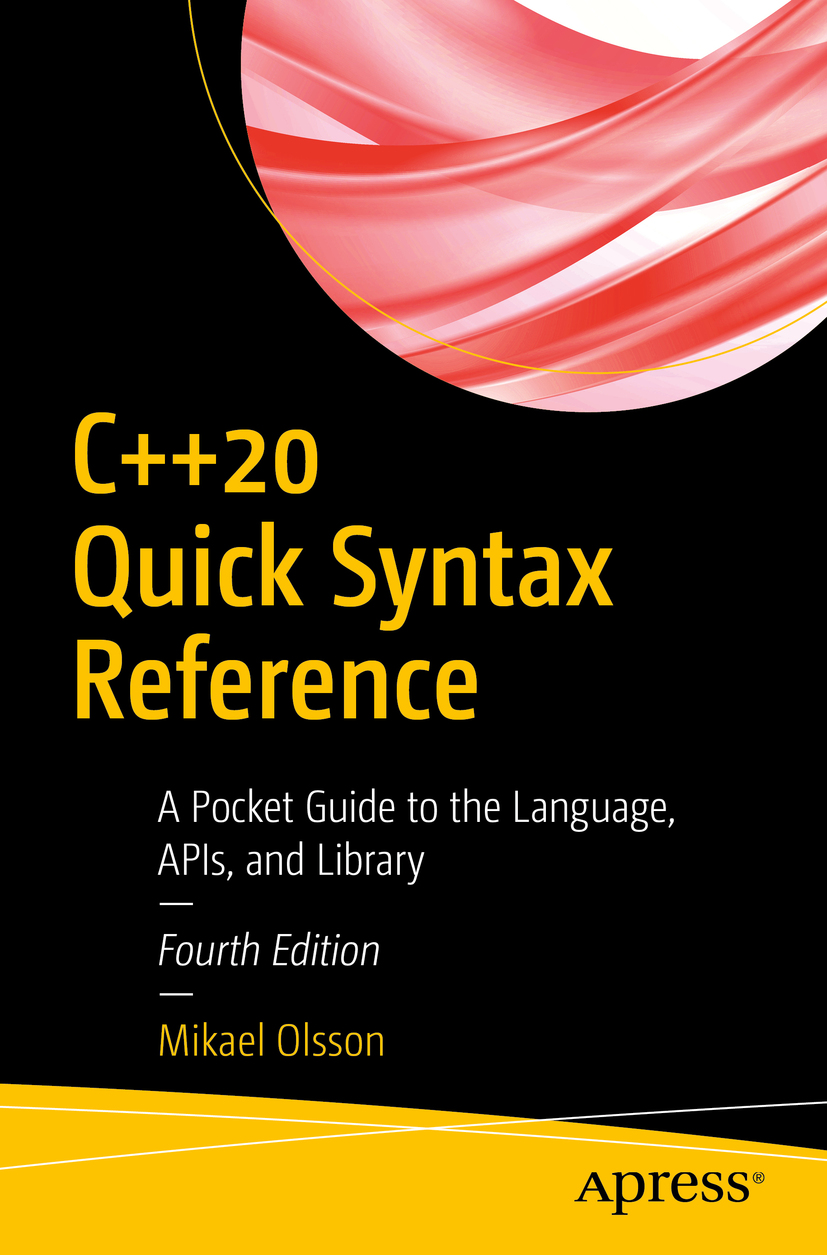

Any source code or other supplementary material referenced by the author in this book is available to readers on GitHub via the books product page, located at www.apress.com/9781484259948 . For more detailed information, please visit http://www.apress.com/source-code .
The C++ programming language is a general-purpose multiparadigm language created by Bjarne Stroustrup. The development of the language started in 1979 under the name C with classes. As the name implies, it was an extension of the C language with the additional concept of classes. Stroustrup wanted to create a better C that combined the power and efficiency of C with high-level abstractions to better manage large development projects. The resulting language was renamed C++ (pronounced C-plus-plus) in 1983. As a deliberate design feature, C++ maintains compatibility with C, and so most C code can easily be made to compile in C++.
The introduction of C++ became a major milestone in the software industry as a widely successful language for both system and application development. System programming involves software that controls the computer hardware directly, such as drivers, operating systems, and software for embedded microprocessors. These areas remain the core domain of the language, where resources are scarce and come at a premium. C++ is also widely used for writing applications, which run on top of system software, especially high-performance software such as games, databases, and resource-demanding desktop applications. Despite the introduction of many modern, high-level languages in this domainsuch as Java, C#, and PythonC++ still holds its own and overall remains one of the most popular and influential programming languages in use today.
There are several reasons for the widespread adoption of C++. The foremost reason was the rare combination of high-level and low-level abstractions from the hardware. The low-level efficiency was inherited from C, and the high-level constructs came in part from a simulation language called Simula. This combination makes it possible to write C++ software with the strength of both approaches. Another strong point of the language is that it does not impose a specific programming paradigm on its users. It is designed to give the programmer a lot of freedom by supporting many different programming styles or paradigms, such as procedural, object-oriented, and generic programming.
C++ is updated and maintained by the C++ standards committee. In 1998, the first international standard was published, known informally as C++98. The language has since undergone five more revisions with further improvements, including C++03, C++11, C++14, C++17, and most recently C++20, which is the latest ISO standard for the C++ programming language released in 2020.
is a professional web entrepreneur, programmer, and author. He works for an R&D company in Finland where he specializes in software development.
In his spare time, he writes books and creates websites that summarize various fields of interest. The books he writes are focused on teaching their subject in the most efficient way possible, by explaining only what is relevant and practical without any unnecessary repetition or theory.
is a software engineer from Belgium. He graduated from the University of Leuven, Belgium, with a degree in Burgerlijk ingenieur in de computerwetenschappen (equivalent to a master of science degree in computer engineering). The year after, he received the cum laude degree of master in artificial intelligence at the same university. After his studies, Marc started working for a software consultancy company called Ordina Belgium. As a consultant, he worked for Siemens and Nokia Siemens Networks on critical 2G and 3G software running on Solaris for telecom operators. This required working on international teams stretching from South America and the United States to Europe, the Middle East, and Asia. Currently, Marc works for Nikon Metrology on industrial 3D laser scanning software.
To begin developing in C++, you need a text editor and a C++ compiler . You can get both at the same time by installing an Integrated Development Environment (IDE) that includes support for C++. A good choice is Microsoft's Visual Studio Community Edition, which is a free version of Visual Studio that is available from Microsofts website. The C++ compiler that comes with this IDE has good support for the C++17 standard and includes many features of C++20 as of the 2019 version. If you are running the Visual Studio installer on Windows, make sure to select the Desktop development with C++ workload to enable development in C++.
Visual Studio is available on Windows and Mac, and there is a lightweight version called Visual Studio Code which can also be run on Linux. Two other popular cross-platform IDEs include NetBeans and Eclipse CDT . Alternatively, you can develop using a simple text editor such as Notepad, although this is less convenient than using an IDE. If you choose to use a simple text editor, just create an empty document with a .cpp file extension and open it in the editor of your choice.
Font size:
Interval:
Bookmark:
Similar books «C++20 Quick Syntax Reference A Pocket Guide to the Language, APIs, and Library.»
Look at similar books to C++20 Quick Syntax Reference A Pocket Guide to the Language, APIs, and Library.. We have selected literature similar in name and meaning in the hope of providing readers with more options to find new, interesting, not yet read works.
Discussion, reviews of the book C++20 Quick Syntax Reference A Pocket Guide to the Language, APIs, and Library. and just readers' own opinions. Leave your comments, write what you think about the work, its meaning or the main characters. Specify what exactly you liked and what you didn't like, and why you think so.

